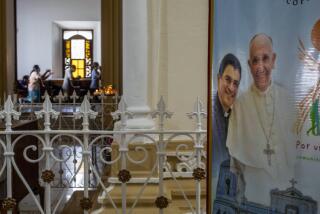Managua, Contras Agree on Site for Talks
- Share via
SAN JOSE, Costa Rica — The Nicaraguan government and U.S.-backed rebels agreed Monday on a mediator’s proposal to open indirect cease-fire negotiations in the Dominican Republic, ending a monthlong dispute over the site of the talks.
Each side announced that it will send a negotiating team to meet separately in the Dominican capital of Santo Domingo on Thursday with the mediator, Cardinal Miguel Obando y Bravo.
Disagreement over a site had threatened to delay the talks and prolong the six-year-old conflict. The dispute had been simmering since the Sandinista government agreed on Nov. 5 to negotiate a truce with rebel leaders and asked Obando, Nicaragua’s Roman Catholic primate, to act as a go-between.
Obando offered the site Monday after the Nicaraguan Bishops Conference met in Managua to endorse his mediator role.
Can Make Own Proposals
The cardinal told reporters that each side had handed him an initial proposal that he was sure the other would reject. But he said both parties had given him authority to make his own proposals to move the negotiations forward.
“It will probably take a lot of talking, a lot of discussions and maybe a lot of time,” Obando said.
The talks will be the third effort to halt a guerrilla war under terms of a Central American peace accord signed by the region’s five presidents on Aug. 7. Negotiations to end fighting in El Salvador and Guatemala have broken off.
The wrangling over the site of the Nicaraguan talks was settled by compromise.
Nicaraguan President Daniel Ortega had said he wanted the talks held in Washington so that House Speaker Jim Wright (D-Tex.), an opponent of U.S. aid to the Contras, could be involved as a witness to the Sandinistas’ good faith.
Washington Rejected
Ortega traveled to Washington with the government’s 11-point truce proposal and invited Obando to receive it there on Nov. 13, in Wright’s presence.
Rebel leaders rejected Washington as a site because they want to play down their image as a U.S.-financed insurgency. Instead, they suggested talks in Managua, and Obando endorsed the idea. But when they offered last week to send a delegation to the Nicaraguan capital to hand their cease-fire proposal to Obando, the Sandinistas refused to permit a plane carrying the rebels to land in Nicaragua.
Ortega said exiled rebel leaders could not return to Nicaragua without accepting amnesty, a condition that they reject.
The Sandinistas ruled out talks elsewhere in Central America, arguing that the August peace accord prohibited organized activity by insurgent leaders anywhere in the region--even for peace negotiations.
Costa Rican President Oscar Arias Sanchez, author of the peace accord, did not accept that interpretation. But Arias asked Obando to call off his scheduled meeting with Nicaraguan rebel leaders here after Ortega telephoned both men last week to object.
Arias told reporters Sunday that he was “getting more and more impatient” with the dispute over the site “while hundreds of Nicaraguans die on the battlefield.”
Rebel leaders said privately that they were upset by Arias’ decision but went along with it in the interest of avoiding further delay.
The Dominican Republic was chosen to host the truce talks because it is the closest democratic country that is not part of Central America or the Contadora Group of eight Latin American nations, Costa Rican officials said.
Rebel leaders had told Obando that they thought the governments of the Contadora nations--Mexico, Panama, Colombia, Venezuela, Peru, Brazil, Uruguay and Argentina--were more favorable to the Sandinistas.
Ortega, who received the rebels’ truce proposal Monday, named a negotiating team headed by Maj. Ricardo Wheelock, chief of army intelligence.
The four-man rebel team that will go to Santo Domingo is headed by Jaime Morales Carazo, a former banker in Nicaragua and now a civilian adviser on Contra military affairs. The team includes two other civilians and a rebel field commander, Walter Calderon.
Obando named two Nicaraguan bishops and a lawyer-priest as advisers. He said they expect to meet with both sides Thursday, make suggestions for modifying their proposals and return to Managua that day.
The Sandinista truce offer made public by Ortega would require the estimated 10,000 rebel troops inside Nicaragua to move into one of three government-controlled cease-fire zones and surrender their weapons within a month to be eligible for amnesty.
The Contra proposal has not been made public.
More to Read
Sign up for Essential California
The most important California stories and recommendations in your inbox every morning.
You may occasionally receive promotional content from the Los Angeles Times.










